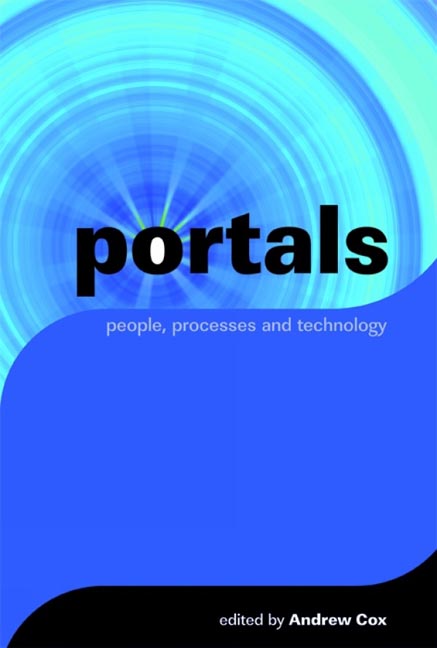Introductory preface
Published online by Cambridge University Press: 09 June 2018
Summary
Purpose
The meaning of the word ‘portal’ is elusive, fuzzy, but people persist in using it. It captures something people want to say. It is a valuable property that can sell software, websites and projects. At some level it expresses what users and organizations are looking for.
The purpose of this book is to draw together authors from multiple perspectives to explore themes and sectoral experiences as a way of increasing our general understanding of how the concept of the portal is being realized in different contexts. Many previous books have focused on the latest technology. Others have tended to concentrate on web, corporate or academic portals – ignoring the potential and reality for cross-sector learning. This book tries to bring many different views together, both to capture directly lessons and wisdom about portals and to stimulate the reader to think about what cross-linkages can be made. The primary focus is the efforts of organizations to create portals for their own members, rather than general web portals, but their relevance as models is recognized in most chapters. The chapters are probably more suggestive and stimulating than conclusive. I hope the reader will feel they have learnt a lot from reading the book, but they will probably not have found simple or easy answers.
In the first section of the book authors tackle broad themes such as technologies, personalization, usability and management issues. Even if one questions the value of the term ‘portal’, it is clear that these are now key issues in information service management. The second section focuses more specifically on the role of information professionals and libraries in portals. In the third and fourth sections, authors explore the experience of portals in different sectors, sometimes capturing a particular institution's experience, sometimes reflecting on whole industries. The three chapters in the final section deal specifically with an issue that is present throughout the book: the future of portals.
Each author speaks in their own voice, with the section introductions setting some context, adding some points that have not been covered by the chapter authors and suggesting a few of the many connections and contrasts that can be made between chapters.
- Type
- Chapter
- Information
- Portalspeople, processes and technology, pp. v - viPublisher: FacetPrint publication year: 2006



